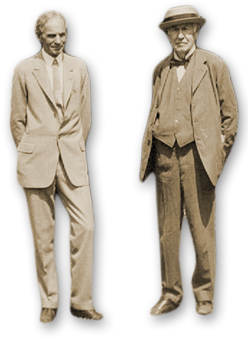America’s First Mail Order Seed Company
September 10, 2024
By Karen Maxwell, Horticulture Programs Coordinator and Horticulture Specialist
With the summer heat, most Floridians are looking forward to the arrival of fall. It is this time of year that we can once again revel joyfully and productively in our gardens, envisioning a bountiful winter harvest. This is also the time of year to purchase seeds.
If you have spent the summer wondering where the idea for seed packages originated, this article is for you! Let me take you for a short journey down the road from our summer camp in Maine (“camp” is what any self-respecting Mainer calls their lake house or lake cottage) to the last active Shaker Village in the world. Officially known as the United Society of Believers in Christ’s Second Appearing, or Shakers for short, this once thriving sect of nearly 6,000 individuals is down to two; brother, Arnold and sister, June.Ironically, the last one standing was once considered the poorest and smallest of the 19 Shaker communities.
The Shaker diaspora began in 1776 when Ann Lee, an Englishwoman, brought her group of followers to create their first colony in New Lebanon, NY. Shaker settlements would soon appear throughout New England and as far south as Kentucky. Nearby to our camp, the Sabbathday Lake Village was established in New Gloucester and Poland, Maine in 1794. Called Shakers for their ebullient dancing, this religious group broke from Calvinists and are beholden to a strong theology of nature. Their ethics for stewardship of nature includes three basic tenets: 1.) Nature is God’s handiwork; 2.) Nature is good because it is useful; and 3.) Nature is the companion that binds a social community with an ecological community.
As such, the Shaker Village of Sabbathday Lake consists of 1,600 acres and was listed as a National Historic Landmark in 1974. The Shakers were not apocalypticists – these Millenialists were not doomsday believers, in fact they embraced technology, firmly believing that there was no virtue in hard manual labor if human intelligence was able to find a way to abbreviate or reduce stressful labor. It was this attitude that enabled the Shakers to create flat brooms, metal pens, many farm tools and even the circular saw which they employed in the manufacture of their iconic furniture.
Their most profitable invention redefined horticultural practices in early America and that was mail order seed packets! Brother, Joseph Turner of the Mount Lebanon Village in New York is considered America’s first seed salesman (1794). David Landreth would soon follow with packaged zinnias in 1798. While the Shakers originally traded their seeds as part of their industrious commerce with outsiders, they soon realized that to set aside land specifically to grow seeds would yield great monetary rewards.
At the Sabbathday Lake village, the concept of creating small envelopes complete with growing instructions, which they called “papers” were displayed in handmade oval wooden boxes, and they created the first seed catalogs. Shakers peddled the seed packages on routes throughout the Northeast. From 1800-1880, their mail-order seeds were often the only source available to rural, pioneering Americans. The Shakers took immense pride in the quality of their seeds; if the buyer didn’t accept that the seeds were not warranted, they were to be returned immediately. It was this belief in their superior products that brought about the demise of The Shaker Seed Company when around 1890 they refused to lower their prices to remain competitive.
The Sabbathday Lake Shakers wanted more property in Alfred, Maine, which was about 50 miles away. To entice the owner, Jabez Ricker, to part with the desired land, the Shakers suggested trading some of their vast estate in Poland, Maine which was situated adjacent to the busy Portland, Maine. In 1845, the Shaker’s new neighbor, Jabez Ricker, founded the Poland Spring Water company – and yes, the original source is still there, on that very land.
Over the years, the Shakers and the Poland Spring Resort enjoyed a mutually beneficial relationship – the Shakers sold their vegetables, fir balsam pillows, maple syrup, and so many flowers to the guests that they needed to build a greenhouse. The Shakers even milled the lumber and built the early wooden crates for Poland Spring bottled water distribution.
What’s next for the world’s remaining Shakers? Ultimately, their vows of celibacy cannot promise them a future and today their magnificent agricultural property is communally owned by Brother, Arnold and Sister, June – backed by a trust to the state of Maine to ensure the property remains as is, in perpetuity. A number of volunteers and employees operate and sustain the property today.
While still maintaining extensive orchards and farm animals, the Shakers continue to grow and market herbs. More than six acres are dedicated just to growing herbs, which are packaged and sold on site and via mail order. In one of the Village pictures, a building is being lifted in preparation for a new foundation. Along with a grant from the National Endowment for the Humanities, the last remaining Shaker community is in the process of creating a world-class Herb Cultural Center which will house over 8,000 square feet of production space, teaching and meditation space.
We hope you will visit our Garden Shoppe and Museum Store, where a wonderful selection of packaged seeds awaits you.


